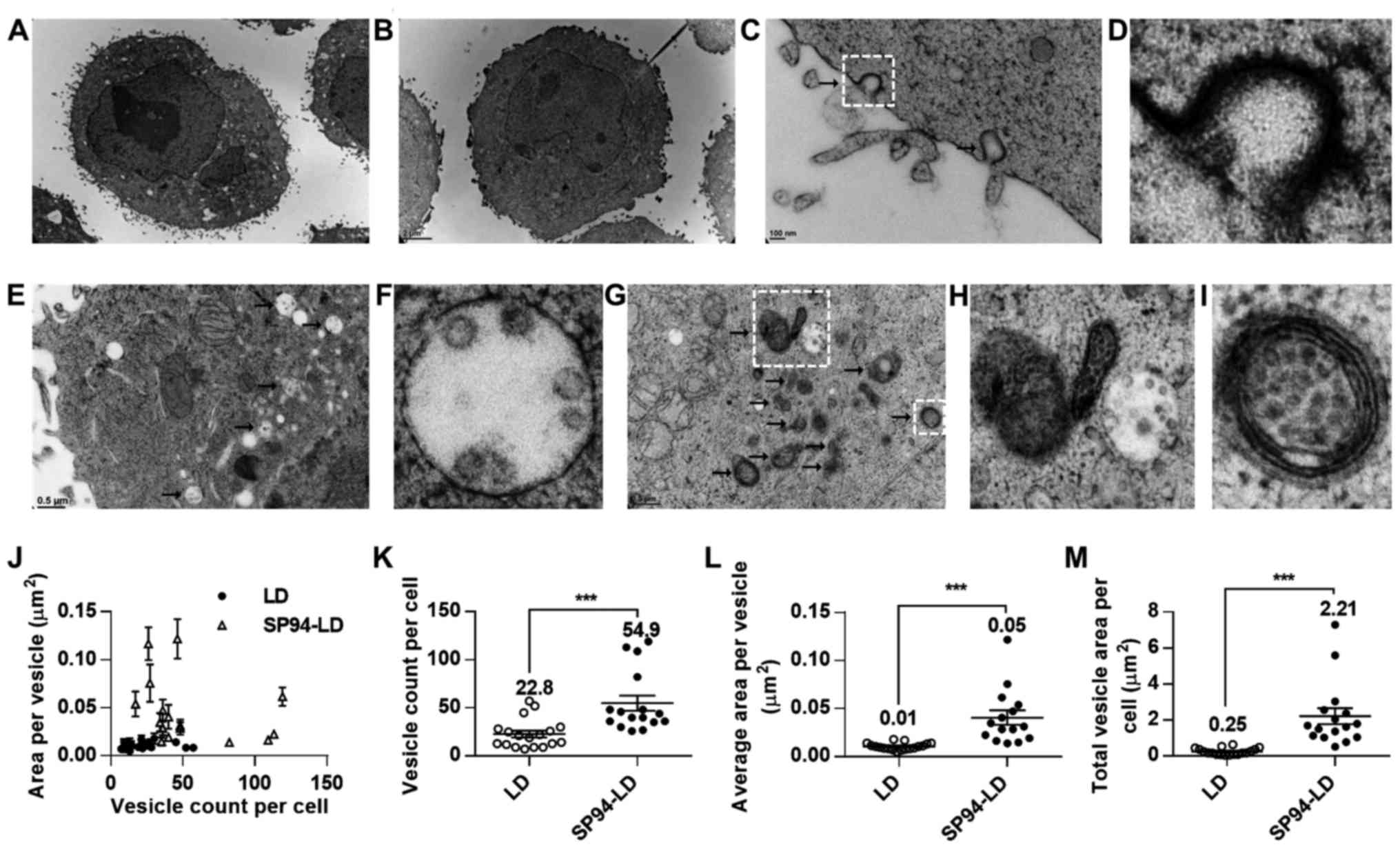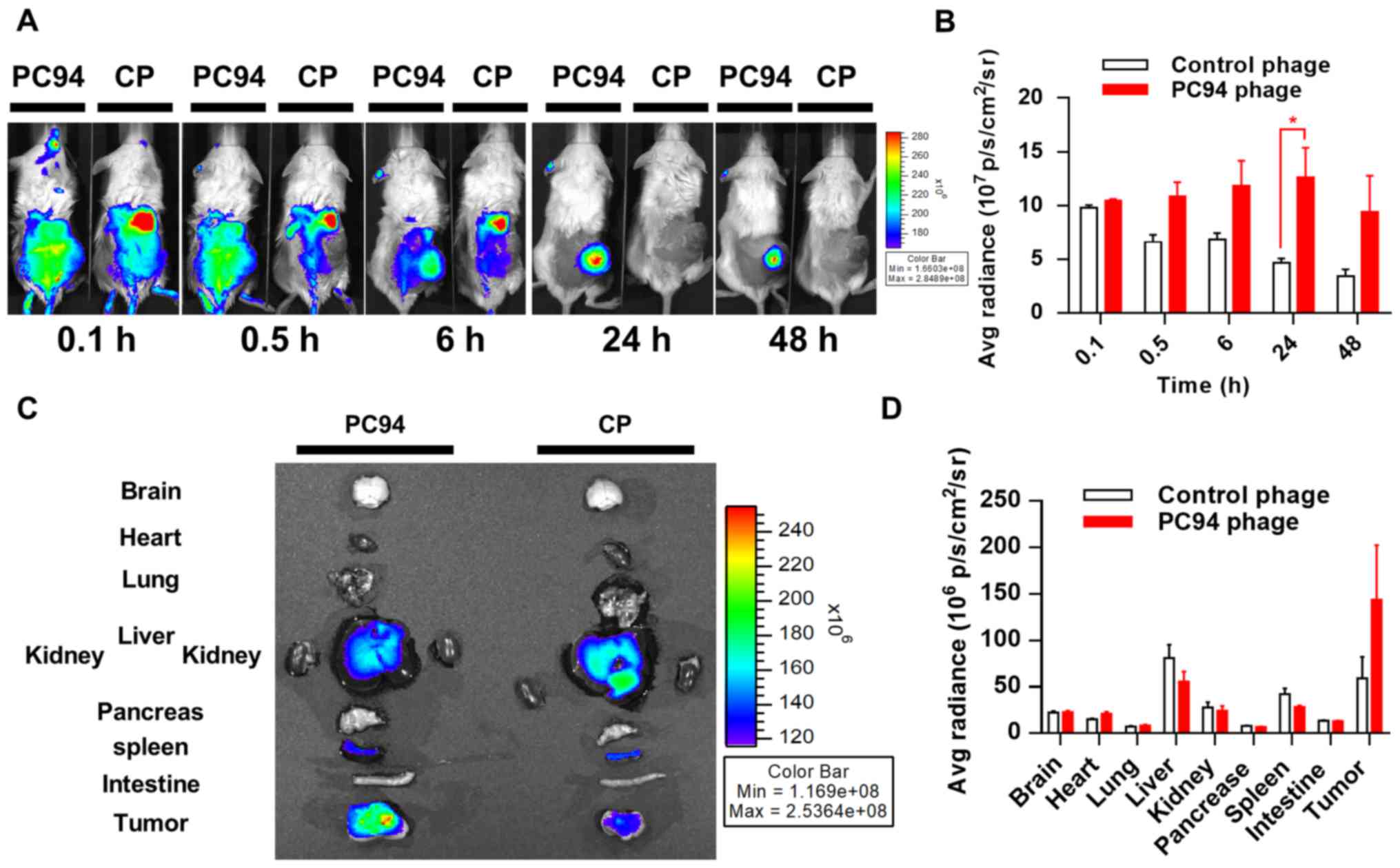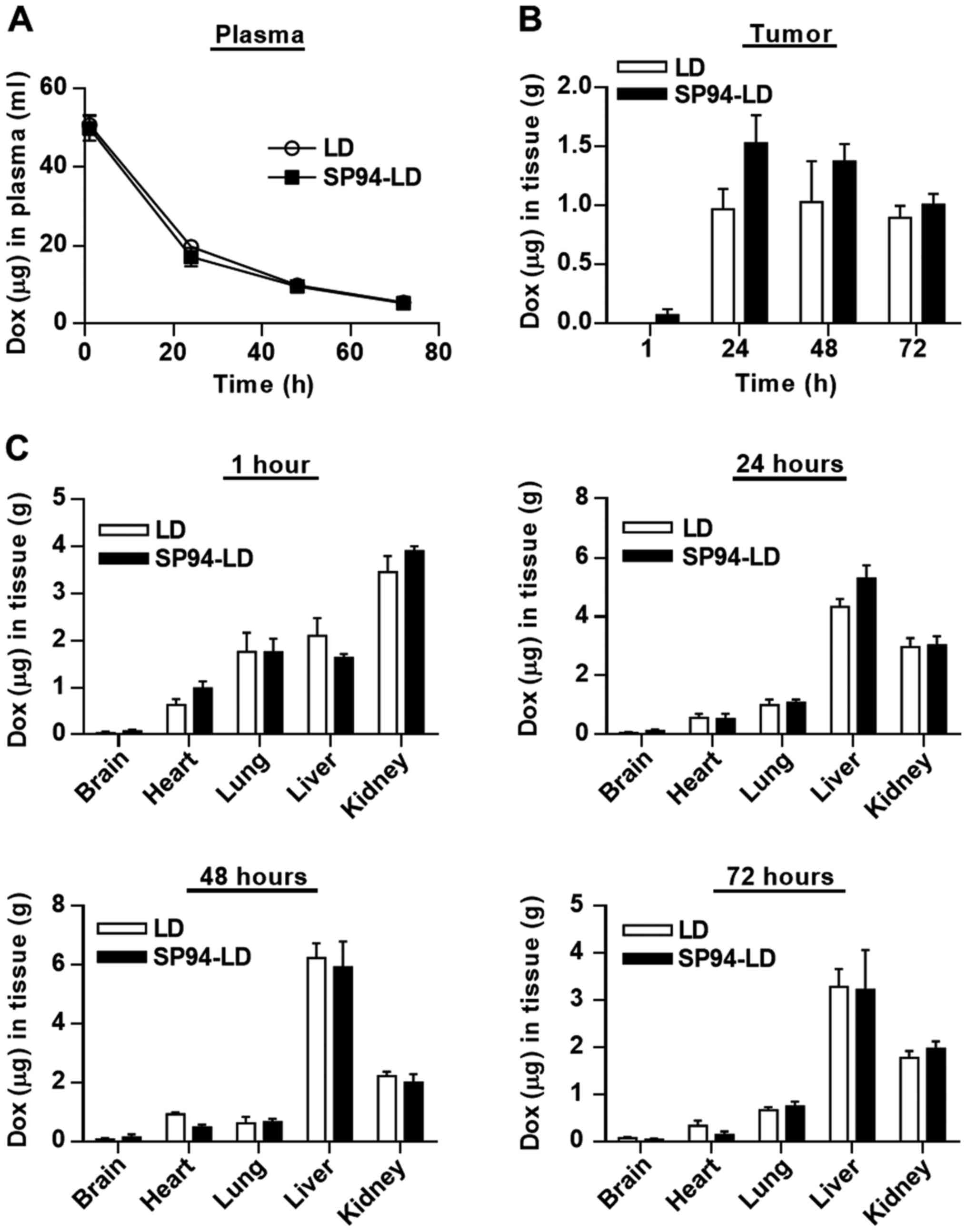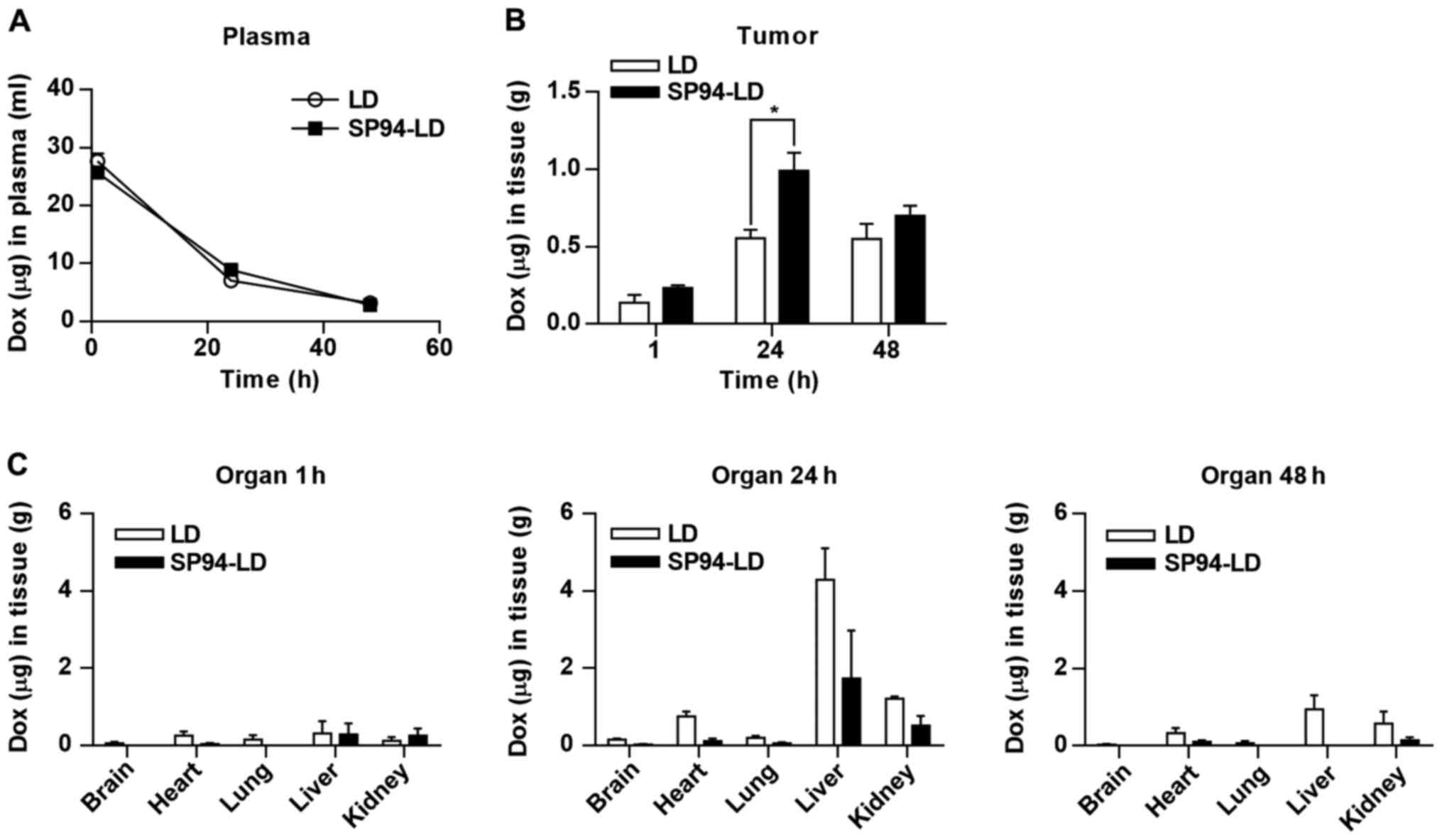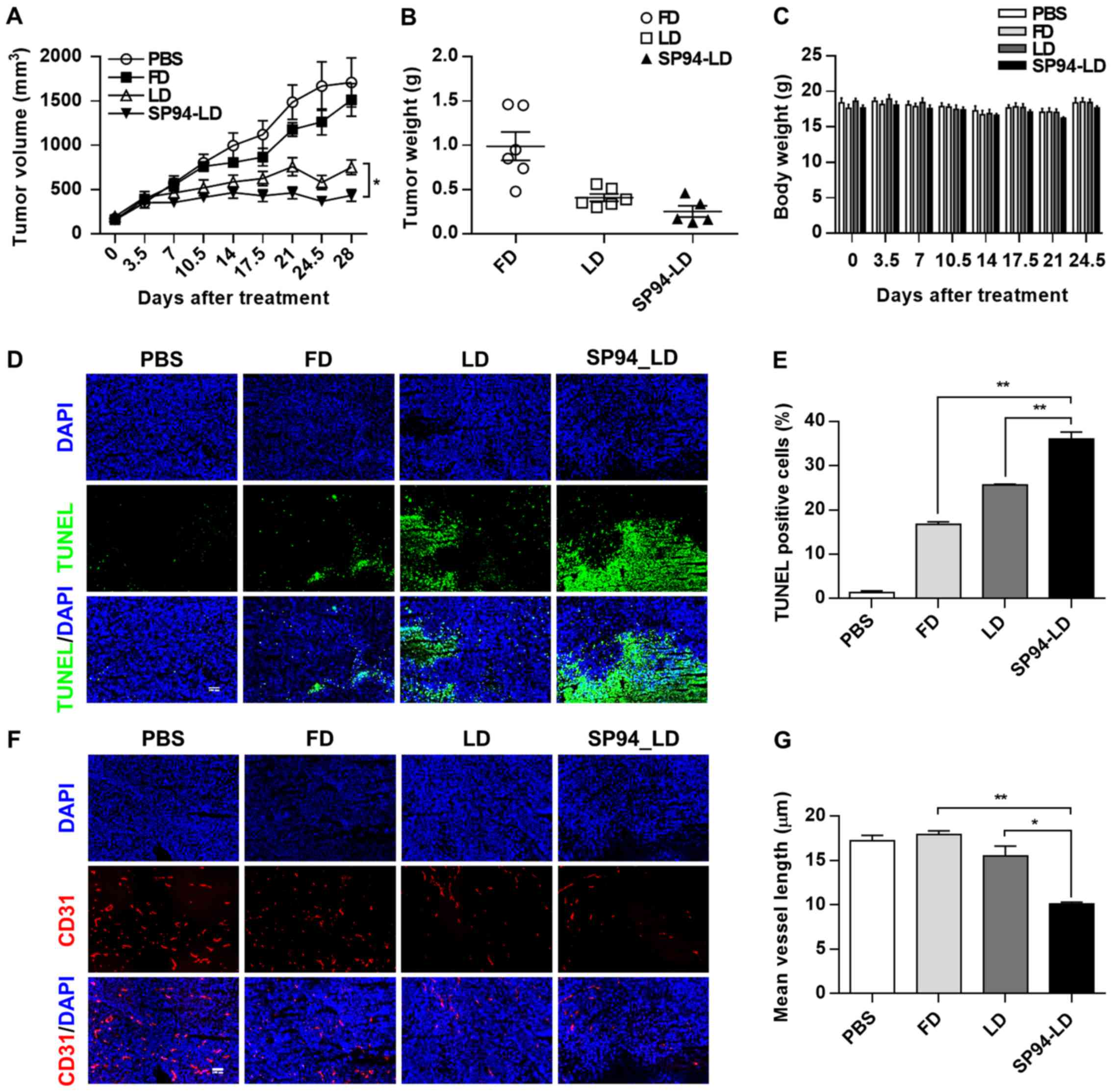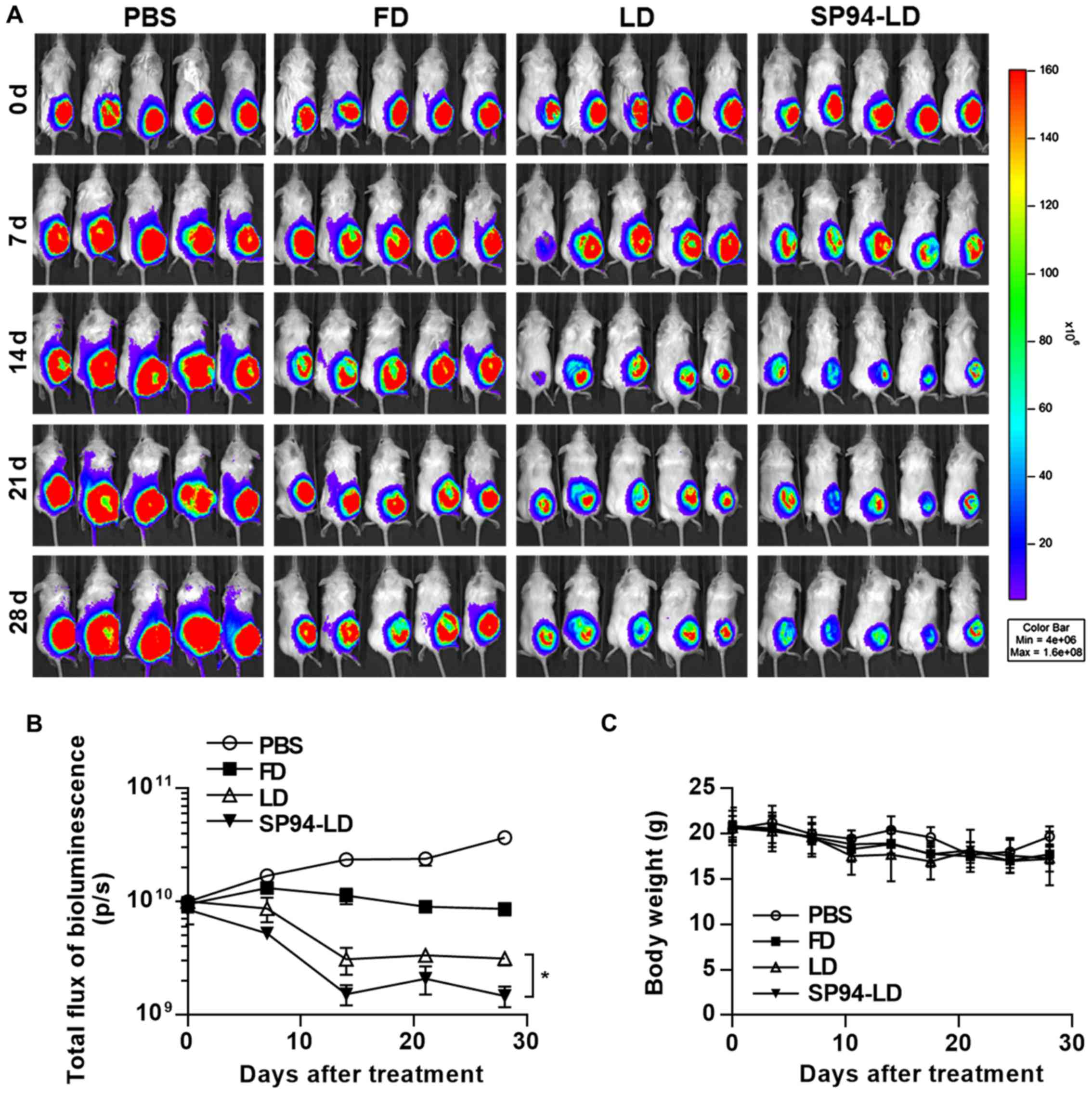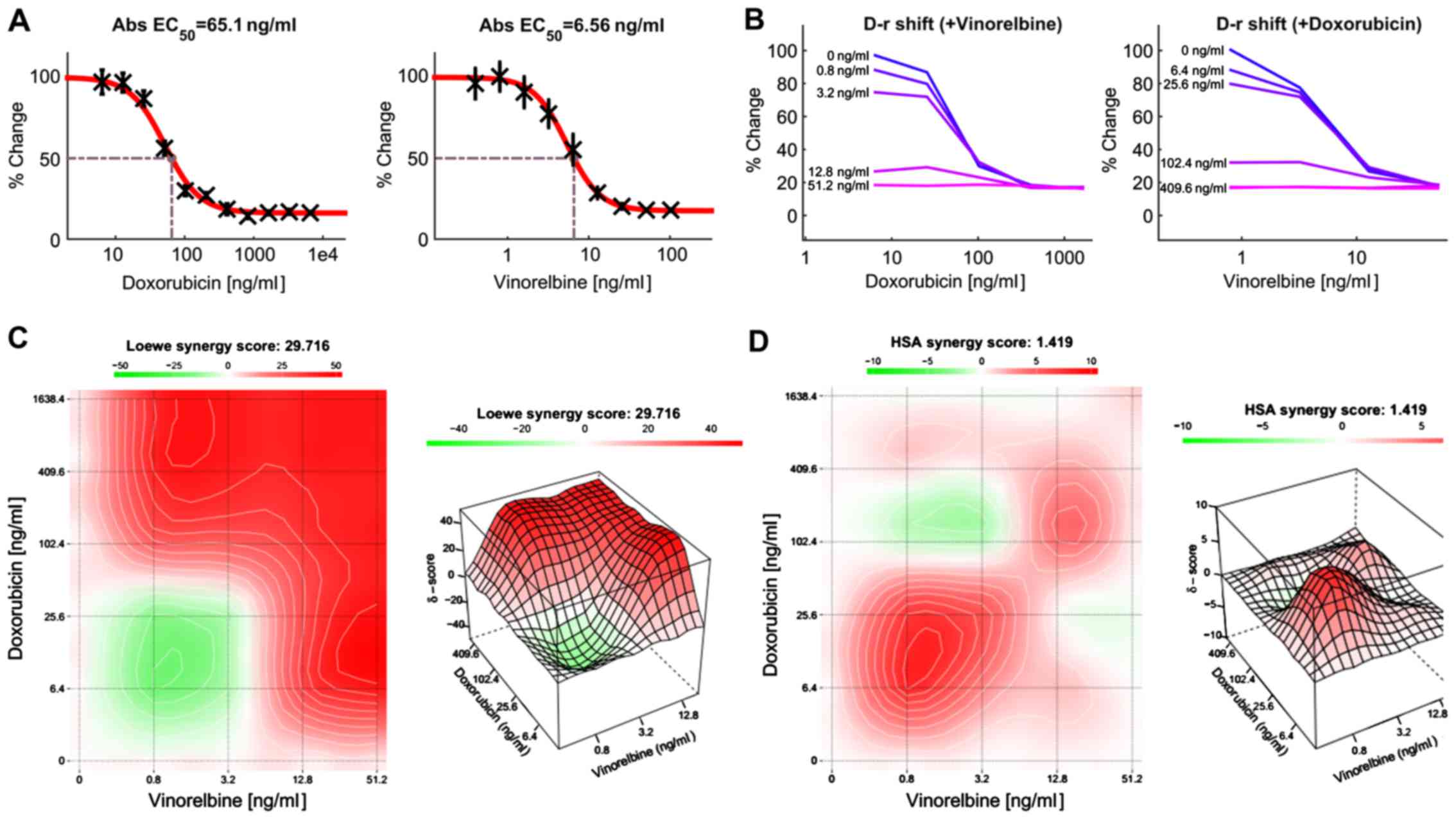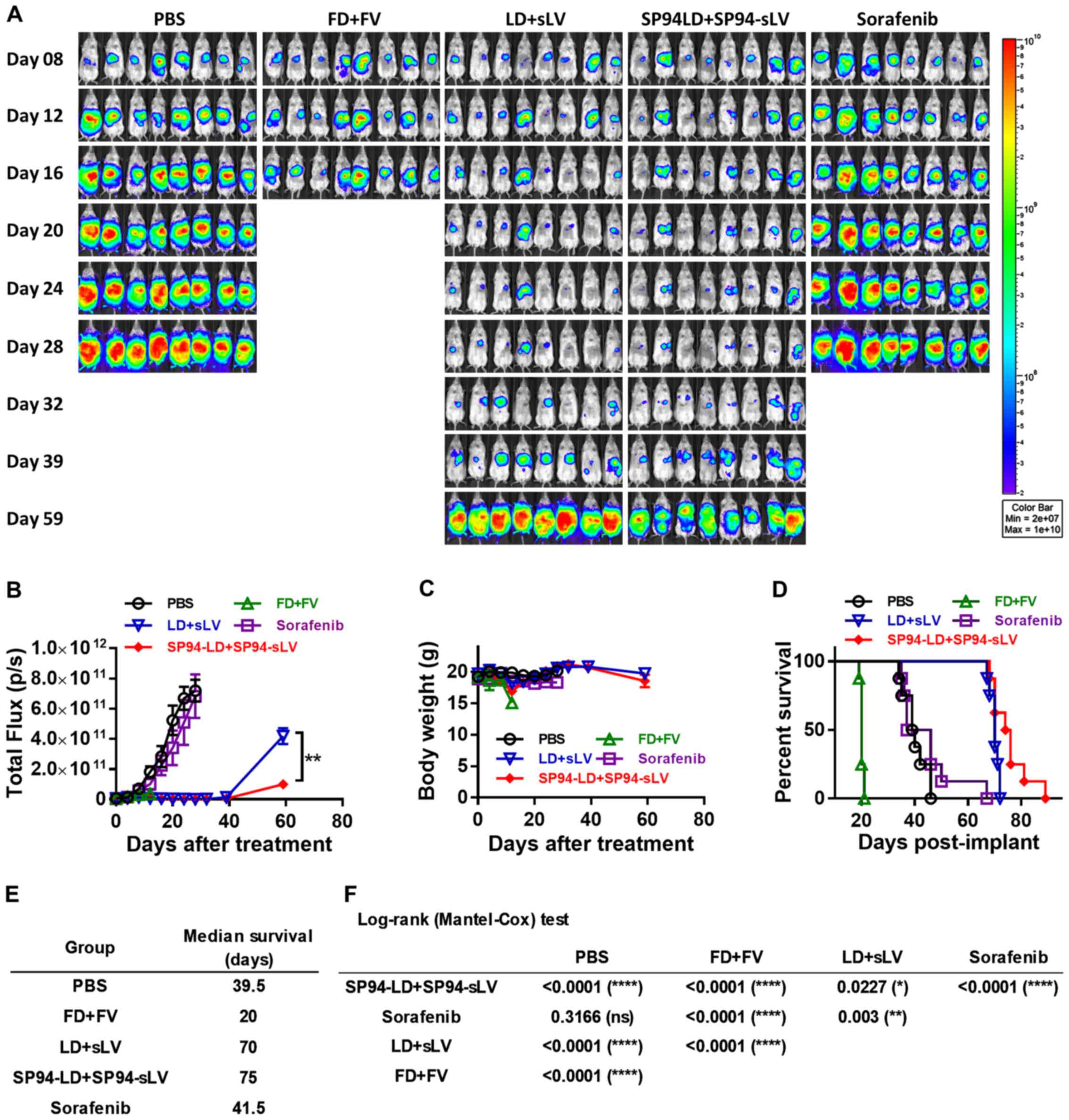|
1
|
Souto E: Lipid Nanocarriers in Cancer
Diagnosis and Therapy. iSmithers Rapra Publishing; Shrewsbury:
2011
|
|
2
|
Maeda H, Wu J, Sawa T, Matsumura Y and
Hori K: Tumor vascular permeability and the EPR effect in
macromolecular therapeutics: A review. J Controlled Release.
65:271–284. 2000. View Article : Google Scholar
|
|
3
|
Wu CH, Liu IJ, Lu RM and Wu HC:
Advancement and applications of peptide phage display technology in
biomedical science. J Biomed Sci. 23:82016. View Article : Google Scholar : PubMed/NCBI
|
|
4
|
Lopes de Menezes DE, Pilarski LM and Allen
TM: In vitro and in vivo targeting of immunoliposomal doxorubicin
to human B-cell lymphoma. Cancer Res. 58:3320–3330. 1998.PubMed/NCBI
|
|
5
|
Lu RM, Chang YL, Chen MS and Wu HC: Single
chain anti-c-Met antibody conjugated nanoparticles for in vivo
tumor-targeted imaging and drug delivery. Biomaterials.
32:3265–3274. 2011. View Article : Google Scholar : PubMed/NCBI
|
|
6
|
Farokhzad OC, Jon S, Khademhosseini A,
Tran TN, Lavan DA and Langer R: Nanoparticle-aptamer bioconjugates:
A new approach for targeting prostate cancer cells. Cancer Res.
64:7668–7672. 2004. View Article : Google Scholar : PubMed/NCBI
|
|
7
|
Gabizon A, Shmeeda H, Horowitz AT and
Zalipsky S: Tumor cell targeting of liposome-entrapped drugs with
phospholipid-anchored folic acid-PEG conjugates. Adv Drug Deliv
Rev. 56:1177–1192. 2004. View Article : Google Scholar : PubMed/NCBI
|
|
8
|
Lee RJ and Low PS: Folate-mediated tumor
cell targeting of liposome-entrapped doxorubicin in vitro. Biochim
Biophys Acta. 1233:134–144. 1995. View Article : Google Scholar : PubMed/NCBI
|
|
9
|
Lee TY, Wu HC, Tseng YL and Lin CT: A
novel peptide specifically binding to nasopharyngeal carcinoma for
targeted drug delivery. Cancer Res. 64:8002–8008. 2004. View Article : Google Scholar : PubMed/NCBI
|
|
10
|
Lo A, Lin CT and Wu HC: Hepatocellular
carcinoma cell-specific peptide ligand for targeted drug delivery.
Mol Cancer Ther. 7:579–589. 2008. View Article : Google Scholar : PubMed/NCBI
|
|
11
|
Wu CH, Kuo YH, Hong RL and Wu HC:
α-Enolase-binding peptide enhances drug delivery efficiency and
therapeutic efficacy against colorectal cancer. Sci Transl Med.
7:290ra912015. View Article : Google Scholar
|
|
12
|
Yeh CY, Hsiao JK, Wang YP, Lan CH and Wu
HC: Peptide-conjugated nanoparticles for targeted imaging and
therapy of prostate cancer. Biomaterials. 99:1–15. 2016. View Article : Google Scholar : PubMed/NCBI
|
|
13
|
Chen WC, Completo GC, Sigal DS, Crocker
PR, Saven A and Paulson JC: In vivo targeting of B-cell lymphoma
with glycan ligands of CD22. Blood. 115:4778–4786. 2010. View Article : Google Scholar : PubMed/NCBI
|
|
14
|
Ashley CE, Carnes EC, Phillips GK, Padilla
D, Durfee PN, Brown PA, Hanna TN, Liu J, Phillips B, Carter MB, et
al: The targeted delivery of multicomponent cargos to cancer cells
by nanoporous particle-supported lipid bilayers. Nat Mater.
10:389–397. 2011. View
Article : Google Scholar : PubMed/NCBI
|
|
15
|
Ashley CE, Carnes EC, Epler KE, Padilla
DP, Phillips GK, Castillo RE, Wilkinson DC, Wilkinson BS, Burgard
CA, Kalinich RM, et al: Delivery of small interfering RNA by
peptide-targeted mesoporous silica nanoparticle-supported lipid
bilayers. ACS Nano. 6:2174–2188. 2012. View Article : Google Scholar : PubMed/NCBI
|
|
16
|
Ashley CE, Carnes EC, Phillips GK, Durfee
PN, Buley MD, Lino CA, Padilla DP, Phillips B, Carter MB, Willman
CL, et al: Cell-specific delivery of diverse cargos by
bacteriophage MS2 virus-like particles. ACS Nano. 5:5729–5745.
2011. View Article : Google Scholar : PubMed/NCBI
|
|
17
|
Li Y, Hu Y, Xiao J, Liu G, Li X, Zhao Y,
Tan H, Shi H and Cheng D: Investigation of SP94 peptide as a
specific probe for hepatocellular carcinoma imaging and therapy.
Sci Rep. 6:335112016. View Article : Google Scholar : PubMed/NCBI
|
|
18
|
Zhang X, Ng HLH, Lu A, Lin C, Zhou L, Lin
G, Zhang Y, Yang Z and Zhang H: Drug delivery system targeting
advanced hepatocellular carcinoma: Current and future. Nanomedicine
(Lond). 12:853–869. 2016. View Article : Google Scholar
|
|
19
|
Villanueva A, Hernandez-Gea V and Llovet
JM: Medical therapies for hepatocellular carcinoma: A critical view
of the evidence. Nat Rev Gastroenterol Hepatol. 10:34–42. 2013.
View Article : Google Scholar
|
|
20
|
Bruix J, Gores GJ and Mazzaferro V:
Hepatocellular carcinoma: Clinical frontiers and perspectives. Gut.
63:844–855. 2014. View Article : Google Scholar : PubMed/NCBI
|
|
21
|
Jaye DL, Geigerman CM, Fuller RE, Akyildiz
A and Parkos CA: Direct fluorochrome labeling of phage display
library clones for studying binding specificities: Applications in
flow cytometry and fluorescence microscopy. J Immunol Methods.
295:119–127. 2004. View Article : Google Scholar
|
|
22
|
Kelly KA, Waterman P and Weissleder R: In
vivo imaging of molecularly targeted phage. Neoplasia. 8:1011–1018.
2006. View Article : Google Scholar
|
|
23
|
Laginha KM, Verwoert S, Charrois GJ and
Allen TM: Determination of doxorubicin levels in whole tumor and
tumor nuclei in murine breast cancer tumors. Clin Cancer Res.
11:6944–6949. 2005. View Article : Google Scholar : PubMed/NCBI
|
|
24
|
Di Veroli GY, Fornari C, Wang D, Mollard
S, Bramhall JL, Richards FM and Jodrell DI: Combenefit: An
interactive platform for the analysis and visualization of drug
combinations. Bioinformatics. 32:2866–2868. 2016. View Article : Google Scholar : PubMed/NCBI
|
|
25
|
Ianevski A, He L, Aittokallio T and Tang
J: SynergyFinder: A web application for analyzing drug combination
dose-response matrix data. Bioinformatics. 33:2413–2415. 2017.
View Article : Google Scholar : PubMed/NCBI
|
|
26
|
Woodcock J and Woosley R: The FDA critical
path initiative and its influence on new drug development. Annu Rev
Med. 59:1–12. 2008. View Article : Google Scholar : PubMed/NCBI
|
|
27
|
Loewe S: The problem of synergism and
antagonism of combined drugs. Arzneimittelforschung. 3:285–290.
1953.PubMed/NCBI
|
|
28
|
Berenbaum MC: What is synergy? Pharmacol
Rev. 41:93–141. 1989.PubMed/NCBI
|
|
29
|
Torchilin VP: Passive and active drug
targeting: Drug delivery to tumors as an example. Handb Exp
Pharmacol. 197:3–53. 2010. View Article : Google Scholar
|
|
30
|
Mohanty C, Das M, Kanwar JR and Sahoo SK:
Receptor mediated tumor targeting: An emerging approach for cancer
therapy. Curr Drug Deliv. 8:45–58. 2011. View Article : Google Scholar
|
|
31
|
Brown KC: Peptidic tumor targeting agents:
The road from phage display peptide selections to clinical
applications. Curr Pharm Des. 16:1040–1054. 2010. View Article : Google Scholar
|
|
32
|
Hilderbrand SA, Kelly KA, Niedre M and
Weissleder R: Near infrared fluorescence-based bacteriophage
particles for ratio-metric pH imaging. Bioconjug Chem.
19:1635–1639. 2008. View Article : Google Scholar : PubMed/NCBI
|
|
33
|
Moreira JN, Ishida T, Gaspar R and Allen
TM: Use of the post-insertion technique to insert peptide ligands
into pre-formed stealth liposomes with retention of binding
activity and cytotoxicity. Pharm Res. 19:265–269. 2002. View Article : Google Scholar : PubMed/NCBI
|
|
34
|
Harding JA, Engbers CM, Newman MS,
Goldstein NI and Zalipsky S: Immunogenicity and pharmacokinetic
attributes of poly(ethylene glycol)-grafted immunoliposomes.
Biochim Biophys Acta. 1327:181–192. 1997. View Article : Google Scholar : PubMed/NCBI
|
|
35
|
Koning GA, Kamps JA and Scherphof GL:
Interference of macrophages with immunotargeting of liposomes. J
Liposome Res. 12:107–119. 2002. View Article : Google Scholar
|
|
36
|
ElBayoumi TA and Torchilin VP:
Tumor-targeted nanomedicines: enhanced antitumor efficacy in vivo
of doxorubicin-loaded, long-circulating liposomes modified with
cancer-specific monoclonal antibody. Clin Cancer Res. 15:1973–1980.
2009. View Article : Google Scholar : PubMed/NCBI
|
|
37
|
Liu Z, Cai W, He L, Nakayama N, Chen K,
Sun X, Chen X and Dai H: In vivo biodistribution and highly
efficient tumour targeting of carbon nanotubes in mice. Nat
Nanotechnol. 2:47–52. 2007. View Article : Google Scholar
|
|
38
|
Qian X, Peng XH, Ansari DO, Yin-Goen Q,
Chen GZ, Shin DM, Yang L, Young AN, Wang MD and Nie S: In vivo
tumor targeting and spectroscopic detection with surface-enhanced
Raman nanoparticle tags. Nat Biotechnol. 26:83–90. 2008. View Article : Google Scholar
|
|
39
|
Kirpotin DB, Drummond DC, Shao Y, Shalaby
MR, Hong K, Nielsen UB, Marks JD, Benz CC and Park JW: Antibody
targeting of long-circulating lipidic nanoparticles does not
increase tumor localization but does increase internalization in
animal models. Cancer Res. 66:6732–6740. 2006. View Article : Google Scholar : PubMed/NCBI
|
|
40
|
Bartlett DW, Su H, Hildebrandt IJ, Weber
WA and Davis ME: Impact of tumor-specific targeting on the
biodistribution and efficacy of siRNA nanoparticles measured by
multimodality in vivo imaging. Proc Natl Acad Sci USA.
104:15549–15554. 2007. View Article : Google Scholar : PubMed/NCBI
|
|
41
|
Moghimi SM, Hunter AC and Andresen TL:
Factors controlling nanoparticle pharmacokinetics: An integrated
analysis and perspective. Annu Rev Pharmacol Toxicol. 52:481–503.
2012. View Article : Google Scholar
|
|
42
|
Adams GP, Schier R, McCall AM, Simmons HH,
Horak EM, Alpaugh RK, Marks JD and Weiner LM: High affinity
restricts the localization and tumor penetration of single-chain fv
antibody molecules. Cancer Res. 61:4750–4755. 2001.PubMed/NCBI
|
|
43
|
Rudnick SI, Lou J, Shaller CC, Tang Y,
Klein-Szanto AJ, Weiner LM, Marks JD and Adams GP: Influence of
affinity and antigen internalization on the uptake and penetration
of Anti-HER2 antibodies in solid tumors. Cancer Res. 71:2250–2259.
2011. View Article : Google Scholar : PubMed/NCBI
|















